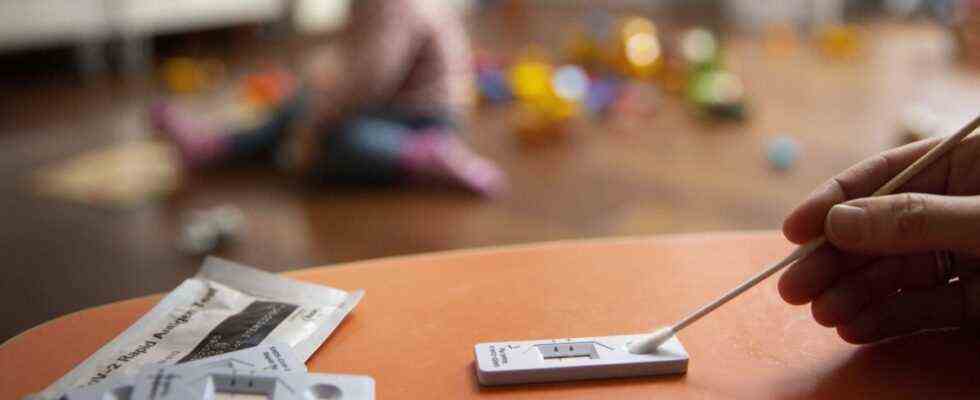Lisa Pfeiffer thinks the easing of the quarantine rules for daycare centers that the state government decided on Tuesday is good. “It is important for the development of the children if they have a regular everyday life as much as possible,” says the educator. As the second chairman of the Association of Kita-Fachkraft Bayern, she also criticizes: It is incomprehensible why air filter systems are only discussed in schools and not in day-care centers. In addition, says Pfeiffer, there is an urgent need for PCR lollipop tests in crèches and kindergartens. Social Minister Carolina Trautner (CSU) has ruled out this type of testing for daycare centers for the time being – other daycare associations as well as the opposition in the state parliament criticize this decision.
Trautner announced on Tuesday that the quarantine regulations in daycare centers and schools would be relaxed. If a child tests positive, the whole group should no longer go into quarantine in the future. Rather, the local health authorities should prepare individual risk assessments that take into account the premises, the care concept and other factors. In this way, close contact persons could be defined who would then have to be in quarantine. After the fifth day, suspected cases should test each other freely again. Trautner rejects PCR pool tests for logistical reasons. You can’t get the test results everywhere on the same day. Instead, there is still a voucher system, according to which parents can receive self-tests free of charge in pharmacies.
Pfeiffer from the Association of Kita Specialists, on the other hand, describes the so-called lollipop tests as more suitable for children. A smear is taken from the mouth of the children. “That could be implemented well, and from our point of view it should also be mandatory, as it is for employees,” says Pfeiffer. The Protestant Daycare Association of Bavaria and the Association of Catholic Day-Care Centers in Bavaria have also been calling on the Ministry of Social Affairs to introduce lollipop tests for months. “In our opinion, the current test strategy, which is to be retained, entails a high administrative burden and is comparatively insecure,” says Maria Magdalena Hellfritsch from the Catholic Association. The renouncement of the lollipop tests is “relatively daring”, especially since one can already see in other federal states that another surge in the pandemic is building up. In crèches and kindergartens, the contact between children and employees is much closer than in primary schools – and the risk of infection is certainly no lower.
“It is rather weak to say that we are not ramping up the system because it is logistically too difficult,” says Doris Rauscher, family policy spokeswoman for the SPD in the state parliament. She has received a lot of feedback from parents who do not have a good feeling about bringing their children to the facilities under the current conditions. From their point of view, the state government is not doing enough to keep daycare centers as open as possible. Rauscher also calls for mandatory testing for unvaccinated educators and other daycare workers. “Practical solutions would be desirable,” complains Johannes Becher, who is responsible for early childhood education at the Greens in the state parliament. It is not understandable why lollipop tests are offered in other countries, such as in elementary school, but why it should fail in day-care centers for logistical reasons. “Logistics is a question of organization. When you get down to business, you get the various porters in Bavaria under one roof.”
Hellfritsch from the Association of Catholic Day-Care Centers reports on various parenting initiatives that are looking for their own solutions because they are dissatisfied with the way the state government has gone. Wolfgang Schramm, emeritus professor for internal medicine, blood coagulation and transfusion medicine at the LMU Munich is organizing a pilot project. So that his grandchildren can safely go to daycare, he has organized private PCR pooling in several Munich daycare centers. Samples from all children in a group are evaluated together. If a pool sample is positive, the samples can be evaluated individually and the sick child can be identified. “It’s safer than the antigen tests and we have early detection of asymptomatic cases,” says Schramm. The parents organize themselves and bring the samples to the laboratory. According to his calculation, the system would cost 40 euros per child per month. However, all of his inquiries to authorities and ministries have so far remained unanswered.

